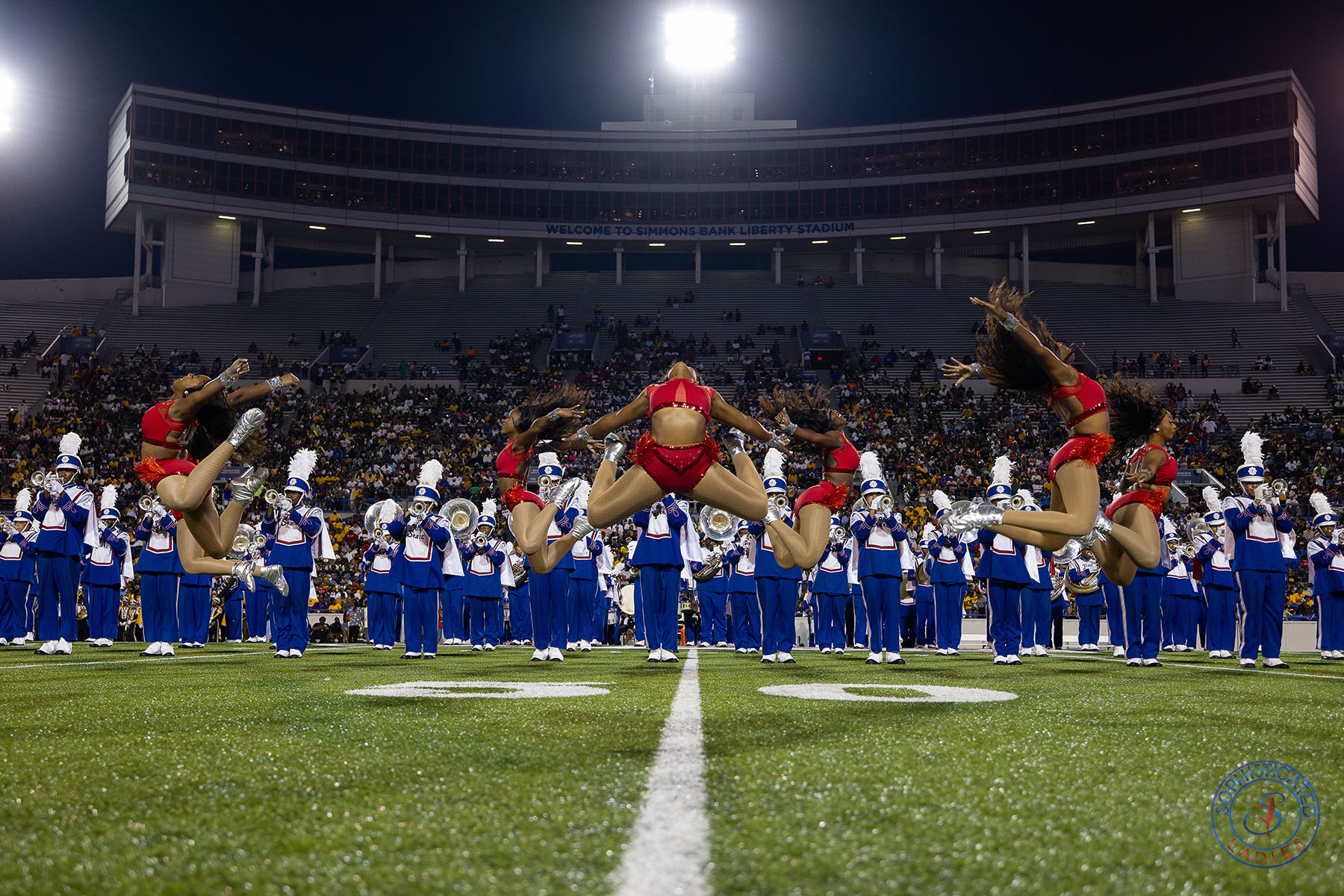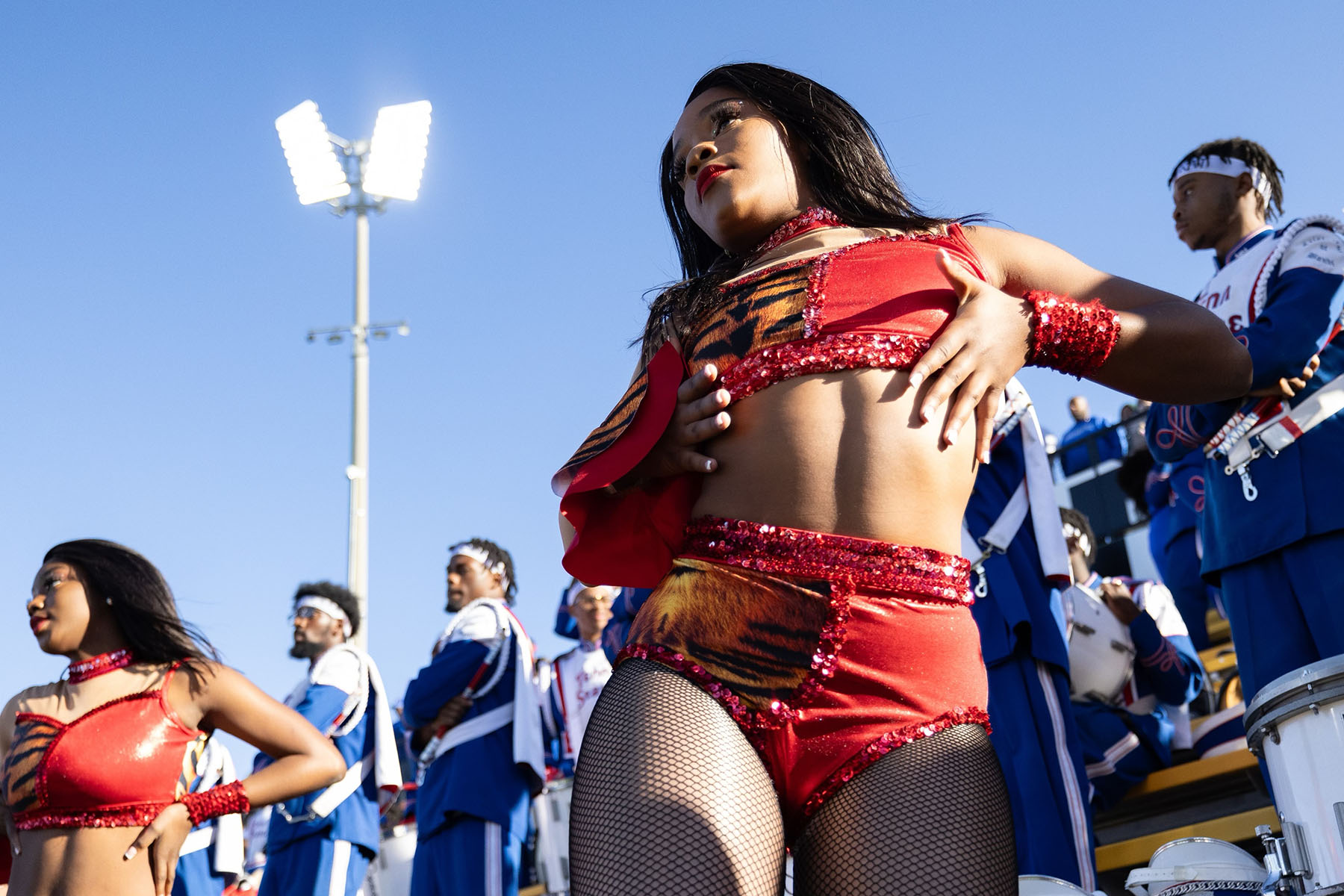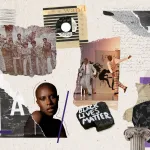Football halftime shows at historically Black colleges and universities are often characterized by the soulful sounds of a 100-piece marching band and intricate performances from drum majors, flag and baton twirlers, and dancers. The preparations can be time-consuming and expensive for students, who have to buy or rent instruments, uniforms and gear on top of paying participation fees.
At most HBCUs, only band members receive performance-based scholarships for their contributions. But Tennessee State University’s Aristocrat of Bands and the Sophisticated Ladies dance team are joining the list of the few HBCUs that offer scholarships to band members and performers.
This past fall, members of the Sophisticated Ladies dance team received over $80,000 in scholarships — a first in the university’s history. According to Melaneice Gibbs — the team’s coach, creative director and choreographer — the scholarships are awarded based on skill and performance following auditions, with captains receiving more because of their additional responsibilities. Team members have the opportunity to increase their scholarship “based on skill and commitment to the team, as well as community engagement.”
The money came just in time for D’Erykah Sudduth, the Sophisticated Ladies’ captain last semester. Sudduth told The 19th she had accrued about $15,000 in student loan debt since starting college in fall 2020. The roughly $6,000 she received from the band as the team captain meant she did not have to take out a loan for her final semester of college.
“I feel like that’s a big thing because student debt is a real thing, and those loans add up really, really, really quickly,” Sudduth said. “And I love that for the students behind me who just might need those last few dollars and don’t have to get a loan. It keeps them from student debt.”
Madison Scott, a 19-year-old sophomore public health major and the co-captain of the Sophisticated Ladies this academic year, said, “It’s good to know that we have help now,” especially in regards to how hard the team works.
“We work just as hard as [band members], so why aren’t we getting scholarships as well?” Scott said. “As a collegiate dancer, we have practice every single day, Monday through Thursday, 6 p.m. until [the coach] says stop, and then Fridays, 4 p.m. until she says stop. I think the latest we ever went was like 2 a.m.”
The dance scholarship was a bonus for Scott, who has a separate scholarship covering her full tuition. But she said many of her teammates were able to pay off outstanding balances with the help of the scholarship.
Establishing scholarships for the Sophisticated Ladies was a main goal for Gibbs when she started coaching the team a few years ago. According to Gibbs, members of the Sophisticated Ladies dance team can pay over $3,000 in dance fees and performance maintenance each year, and she pays out of her own pocket sometimes to support some of the team’s needs, such as designing custom uniforms and providing healthy snacks and meals during band trips. On average, Gibbs estimates that between her and the team members, they spend $30,000 a year in uniforms and practice and performance needs.

Gibbs, who attended high school in Nashville, recognizes the impact scholarships have in alleviating costs and supporting student performers. She says she received one for baton twirling when she attended Jackson State University, an HBCU in Mississippi. She said the money allowed her to attend Jackson State.
“That was really the difference between me going there and me going to someplace in state. And so just knowing that benefit, and thinking about the experience that I had at Jackson State as a twirler, I wanted to make sure that my team felt that same respect and love as well,” Gibbs told The 19th.
Gibbs took her case for scholarships to the school’s director of bands, Reginald A. McDonald. She also laid out how much team members typically spend, the work they do for the band and university, and what she has had to spend over the years. According to McDonald, about 90 percent of members of the Aristocrat of Bands receive some type of financial assistance from the band through a performance-based scholarship. A few months after Gibbs presented the idea to him, McDonald said he was in favor.
McDonald said her arguments helped him compare the dancers’ work to that of the band members.
“The instrumentalists have to memorize all of this music, they have to memorize all of these movements throughout the show, and it’s the same thing with the dancers,” he said. “Thinking about the dancers and how all of that is a part of what we do — the presentation, you know — it was almost a no-brainer, but I’m glad she [Gibbs] brought it to me.”
The fight for scholarships for HBCU dancers is a multi-layered issue that boils down to funding, according to Shawn Zachery, the executive director of the National HBCU Auxiliary and Dance Directors’ Association and coach of the Prairie View A&M University Black Foxes dance team in Texas.
“The fact of the matter is, most band programs don’t have an open-ended amount of funds. Some have no funds at all for scholarships. In most cases, band directors must make tough decisions, based on the priorities of the program,” Zachery said. “It’s also important to remember that this typically isn’t an issue between band directors and coaches, and any solution must keep that in mind. But seeing what has happened at Tennessee State, and the other HBCUs that provide scholarships to auxiliary members, makes us hopeful and excited.”
The Sophisticated Ladies’ annual audition process has commenced — and so has fundraising for next year’s scholarships. Both Gibbs and McDonald hope the news of scholarships attracts top talent to the program. Further, though, Gibbs hopes other HBCUs will consider offering their dancers scholarships.
“I just really want people to understand and know that these young ladies put in so much work. These coaches put in so much work, and these scholarships are well-deserved. And I hope that the conversation continues, but not just the conversation, I hope that people start to take action,” Gibbs said.







